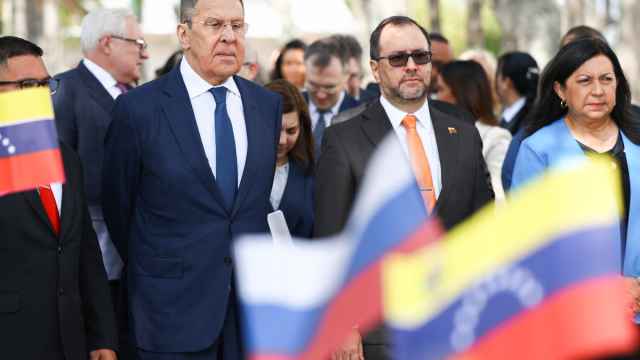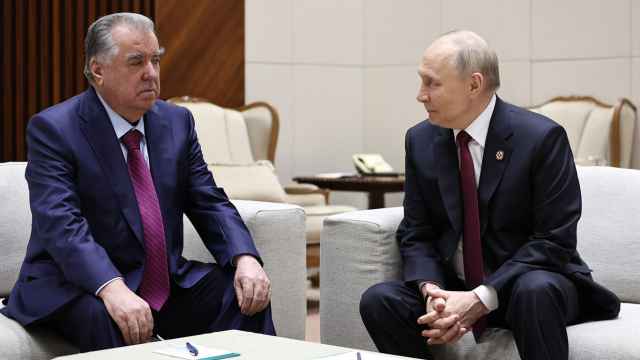U.S. Ambassador Michael McFaul took to Twitter and Facebook on Wednesday in an attempt to refute charges that he's promoting regime change in Russia.
In doing so, he also highlighted the embassy's unprecedented reliance on Twitter and Facebook to connect with the Russian public and fight an onslaught of negative reports in the state-run media.
McFaul called foul on Russia Today over a Tuesday op-ed by analyst Igor Panarin accusing him of plotting to turn anti-corruption blogger Alexei Navalny into a revolutionary leader.
"@M_Simonyan when we met at White House you asked me tell you when RT ran something untrue. On RT today, @McFaul sent @Navalny to Yale. Lie," the ambassador tweeted to RT's editor-in-chief Margarita Simonyan on Wednesday morning.
In a separate Facebook post, McFaul continued: "Does RT have an obligation to correct factual errors in opinion pieces? Or does the fact tha Dr. Ponarin is espressing an 'opinion' give the author a license to say anything, the facts be damned?"
The Facebook post generated more than 60 comments, mostly supportive of McFaul's critique. Simonyan promptly reminded readers in a tweet that Panarin's contained a disclaimer stating that the author's opinions did not necessarily express those of RT.
A U.S. State Department official said that while McFaul isn't the only U.S. ambassador using social media, none of them use it as actively.
McFaul is the first U.S. ambassador to Russia to have a Facebook page or a Twitter blog, both of which he updates frequently with opinions, information about his activities and responses to direct appeals from VIPs and ordinary users alike.
"McFaul is a 21st-century ambassador," said Joseph Kruzich, a spokesman for the U.S. Embassy in Moscow.
Kruzich said the shift to social media reflects McFaul's personal style but is also part of an evolution. Then-Ambassador John Beyrle launched an official blog in February 2009.
Given Russia's booming Internet population, now the largest in Europe, and demonstrators' reliance on social media to organize rallies, the strategy shift couldn't come at a more appropriate time.
Since his arrival in mid-January, McFaul has battled suspicions, fueled by state media, that he and the United States are behind opposition protests demanding political liberalization and fair elections.
The anti-American spin was introduced by Prime Minister Vladimir Putin himself, who in December accused the State Department and Secretary of State Hillary Clinton of financing nongovernmental organizations that were aiding the protesters.
The accusations, which McFaul staunchly denies, have added urgency to his efforts to create a counternarrative through interviews with Russian media and posts on Facebook and Twitter.
"McFaul is the ideal ambassador for the moment because he understands the importance of social networks and informal channels of communication," said Stanislav Belkovsky, a well-connected political analyst.
Yevgeny Minchenko, a political PR consultant, said McFaul is putting the United States on the leading edge of a diplomatic trend.
He said the Iranian Embassy and others were becoming active on social media. He also praised McFaul for contesting the RT article.
Kruzich said McFaul wouldn't respond to every media report he felt was misleading or incorrect.
When asked whether the ambassador's informal style — on Feb. 3, he tweeted "Planning a series of meetings with anyone who wants to chat with Ambo McFaul. Everyone welcome. What is best venue for first meeting?" — would make him a liability on social media, where haste often trumps careful wording, Kruzich said McFaul is "fully capable of speaking on his own behalf."
A Message from The Moscow Times:
Dear readers,
We are facing unprecedented challenges. Russia's Prosecutor General's Office has designated The Moscow Times as an "undesirable" organization, criminalizing our work and putting our staff at risk of prosecution. This follows our earlier unjust labeling as a "foreign agent."
These actions are direct attempts to silence independent journalism in Russia. The authorities claim our work "discredits the decisions of the Russian leadership." We see things differently: we strive to provide accurate, unbiased reporting on Russia.
We, the journalists of The Moscow Times, refuse to be silenced. But to continue our work, we need your help.
Your support, no matter how small, makes a world of difference. If you can, please support us monthly starting from just $2. It's quick to set up, and every contribution makes a significant impact.
By supporting The Moscow Times, you're defending open, independent journalism in the face of repression. Thank you for standing with us.
Remind me later.





